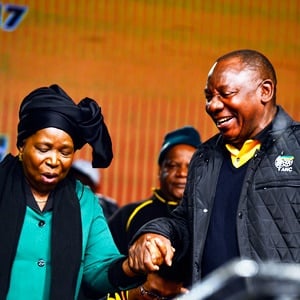
With the ANC's elective conference approaching, Nkosazana Dlamini-Zuma may have a majority of the league votes. To be sure of victory, Cyril Ramaphosa must enter the conference with a comfortable branch majority, says CEO of the Institute for Race Relations, Frans Cronje.
Who is currently ahead in the ANC leadership race?
Mr Cyril Ramaphosa currently leads the race for branch nominations received. At present he has almost twice as many such nominations as his rival, Dr Nkosazana Dlamini-Zuma. However, his lead is based on only a third of branch nominations having been received.
Can Dlamini-Zuma catch up?
She certainly can. Of outstanding branch nominations, we estimate that 63% will come from areas that are more sympathetic to her than they are to Ramaphosa. To gain a branch nomination majority of 50% + 1, we estimate that her camp needs to receive 57% of outstanding nominations.
Are branch nominations an accurate measure against which to determine the eventual winner of the race?
They are a useful measure, but not a perfect one. Bigger branches may send more than one delegate and this will aid the candidate who commands the larger branches. Even where a branch has come out in favour of a candidate there is no guarantee that their delegate will vote for that candidate. Vote buying and intimidation can still skew the result, making prediction tricky.
What other measures can be used to determine the outcome of the race?
Delegate numbers are the most useful measure, but they are very difficult to use as an analytical tool as there is, again, no way to determine if a delegate will break from the brief given by their branch.
Then there are league and other votes – these stretch from the youth league to the executive committee of the party, for example. Approximately ten percent of voting delegates come from these non-branch sources.
We estimate that Dlamini-Zuma may have a majority of the league votes, and that to be sure of victory, Ramaphosa's camp must look to enter the conference with a comfortable branch majority.
Will he have that majority?
We applied three models to the outstanding branch data in pursuit of an answer. If Dr Dlamini-Zuma wins 70% of the support in areas seen as sympathetic to her and 30% in those seen as sympathetic to him, then she will fall more than 10% short of a branch majority and then probably lose the race – even where she has a league advantage.
Other risks then emerge such as a collapse of the conference. However, if that split is 75%/25%, we estimate that she will be just 15 branches (out of over 3 800) behind Ramaphosa, making the race too close to call.
A think-tank should be able to call the result based on available data. That we cannot do so at this stage is a comment on the closeness of the race. If the split is 80%/20% in her favour, then Dlamini-Zuma's camp should have a branch, delegate, and league majority.
Once we have sight of two thirds of branch nomination data we might be able to make a hard call on the winner.
If Ramaphosa wins, how will the top leadership structure of the party change?
A degree of fluidity must still be allowed around leadership slates. However, if his camp triumphs, the ANC leadership may look something like this:
1. President: Cyril Ramaphosa
2. Deputy President: Naledi Pandor or Zweli Mkhize
3. National Chairperson: Gwede Mantashe
4. Secretary General: Senzo Mchunu
5. Deputy Secretary General: Thoko Didiza
6. Treasurer General: Paul Mashatile
The question then emerges as to whether the losing factions will accept the new leadership. Will pro-Zuma factions in KwaZulu-Natal, as one example, accept the authority of the above top-6 structure or will they seek to make the province ungovernable to destabilise Ramaphosa's leadership?
If the latter is the case, then, come January, we may still be nearer the start than the end of the ANC's internal leadership battles.
And if Dlamini-Zuma wins?
If her camp triumphs, we speculate that the ANC's senior leadership will look something like this:
1. President: Nkosazana Dlamini-Zuma
2. Deputy President: David Mabuza
3. National Chairperson: Nathi Mthethwa
4. Secretary General: Ace Magashule
5. 1st Deputy SG: Jessie Duarte
6. 2nd Deputy SG: Phumulo Masualle
7. Treasurer General: Maite Nkoana-Mashabane
Such a structure, particularly if it delivers a crushing defeat to Ramaphosa's camp, may trigger the establishment of an opposition clone of the ANC – a point we will return to below.
Many commentators have suggested that a win for Dlamini-Zuma will see the ANC lose the 2019 election?
The likelihood is that a win for her camp will trigger a series of negative market and economic reactions. South Africa is already in a near-zero GDP growth position. The new finance minister should be congratulated for admitting to the serious budget deficit and debt-to-GDP position the country finds itself in.
The deficit is now on a par with what was inherited at the end of the apartheid era and the debt-to-GDP ratio has exceeded that of 1994. The rate of increase in social grant beneficiary and job numbers has slowed over the past decade as economic growth has slowed.
The labour market absorption rate for people with less than a post-school qualification is below 50%. It is very difficult to see that her leadership slate will introduce the necessary structural reforms to improve the competitiveness of the South African economy. The risk is rather that her slate proceeds with their policy of 'radical economic transformation', causing great damage to the economy and to the living standards of South Africans.
As regards the 2019 election, we have seen polling that makes us cautious about predicting the party's demise in that year. In 2012, we first predicted the ANC's likely defeat in a note to clients and said that this would occur in 2024 – and for now I stick to that.
Its delivery track record in government is better than many of its critics suggest, and a broad cross-section of its leaders are more popular than many in the middle classes and business would believe.
These two factors may give it sufficient momentum to win in 2019, regardless of who comes to lead the party. However, we will revise that view closer to the time.
Will a Ramaphosa-camp victory see South Africa turn the corner and return to stability and prosperity?
Should his camp win, it faces daunting challenges. None of the good fortune (low household debt-to-GDP levels, interest rates that would be cut in half, and bond yields that would also halve) that Thabo Mbeki relied on to stage the economic recovery of the mid-1990s to late-2000s will be on offer to Ramaphosa.
While positive investor sentiment will greet his victory, that will only be sustained if he is able to move swiftly in driving a reform agenda that reinforces property rights, prices poor people into jobs, and removes regulatory obstacles to investment.
Should he speedily pull off such reforms South Africa may draw the investment to drive the economic growth needed to generate the revenues to flatten the deficit and debt curves while gradually beginning to absorb more young people into jobs.
There is a strong correlation between year-on-year changes in household income levels and popular confidence in the future. Ramaphosa needs to capitalise on that correlation to be successful.
What you suggest is that if Ramaphosa loses the race in December then South Africa could be in some real trouble?
It already is in some trouble, but I think you are right to suggest that the trouble may deepen – and quickly. Do not, however, be too obsessed with the December conference result. More important is the Cabinet of 2019.
December is not the only avenue open to Ramaphosa (or his camp) to lead that Cabinet. For example, if they lose in December, that may deliver an environment in which there are more ANC people outside of the ANC than within it.
The ANC rebels or dissidents (those outside of Luthuli House) may then form a clone of the party which may become the senior partner in a coalition to challenge the ANC of Luthuli House for leadership of the country – essentially reducing the 2019 election to a battle between the pre- and post-2008 ANCs.
Don't think of the clone as a split, but rather as a carbon copy of the ANC – same flag, colours, history, and former leaders. It may draw in either the DA or the EFF or both as junior partners. If the coalition led by the clone wins, that would be to turn the ANC's political clock back to November of 2007 in many respects.
Observers need to be open to all these permutations of the current leadership struggle and not see the ANC's December conference as a zero-sum date for South Africa.
- Frans Cronje is a scenario planner and CEO of the IRR – a think tank that promotes political and economic freedom.
Disclaimer: News24 encourages freedom of speech and the expression of diverse views. The views of columnists published on News24 are therefore their own and do not necessarily represent the views of News24.




 Publications
Publications
 Partners
Partners























